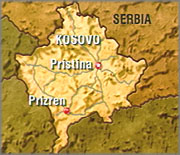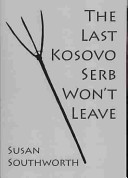March 4, 2012
Susan Southworth’s 2007 novel uncovers, as the title promises, the horrors that always transpire whenever one people, usually in the name of liberty, redefines another people as objects, a reclassification that characterizes ethnic cleansing as patriotism. But this beautifully written novel does so much more. Peeling back the labels resulting from centuries of warfare and hate, Southworth shows us the fears, yes, but also the dignity and nobility of Others, a revelation that should inspire us all even as we weep for their pain.

Map of Kosovo (Source: pbs.org/newshour)
By end of the novel, we follow Donald, a retired American linguist, into southwest Kosovaran town Prizren, where the Kosova Liberation Army celebrates its 1999 triumph over the Serbs, a victory made possible by NATO bombing. Absent from Prizren for a month, Donald expects to find what he left five weeks before: his Turkish friend and fellow linguist Bayram, with whom Donald can share his experiences living with Serbian peasants and resume their discussion of the Albanian language and culture.
Instead, he finds Bayram’s house trashed and valuable manuscripts scattered all over the grounds, acts of the new owner, an army thug. Bayram himself Donald finds in a make-shift jail, cuffed and beaten, lying on a floor littered with feces and surrounded by walls splattered with other victims’ blood (100-108). Though beaten himself, Donald escapes the Kosovaran violence via Macedonia, but not before witnessing Serbs shot in the street (120). In the final chapter, the narrator shows us the fate of the Serbian peasants that had welcomed Donald: Petar has been beheaded, and his wife Leposava wonders off in a daze, looking for the “home”—their cabin and their country—now a “bloody mosaic,” the work of soldiers, not much more than boys, intoxicated by liberty and by a culture of retribution and guns (122).
Before this bloody ending, however, primarily through Donald’s eyes, we learn to see Albanians, Turks, and Serbs not as oppressors or victims but as human beings worthy of our understanding and respect. Through Donald, for instance, we learn to revere the ancient Albanian language and culture (33), and that respect helps us understand how Donald can look at an angry Albanian soldier and see a scared boy, a “sweet-faced teenager” (104) with baggy fatigues on his “skinny frame” (100). Through Donald we also learn to relish coffee, dates, water pipes, baths—all things Turkish, especially his courteous friend Bayram (32-40).

Serbian Gusle & Bow (Source: Wikipedia)
Through Donald we learn as well to respect Serbs who “won’t leave.” Bogdan the Serbian policeman, for example, earns that respect by risking his life daily helping peasants to steer clear of the Liberation Army (5-15, 88-96), as does the young Serbian mountain man by hiding Donald, suspected of being an enemy courier (56-59). Through Donald’s month-long sojourn with the Serbian farmer and his wife, we also come to admire Petar and Leposava, their spiritual intimacy with the land, their domestic harmony and peace, their generosity. Revering their American guest, they feed him hearty bean soup, fresh eggs, and oatmeal cakes; they teach him to hoe the garden and to trap rabbits for supper; they show him how to bathe in the rain-water, how to dance with abandon, how to smell the seasons and fish in the stream (64-86). They also share with Donald their Serbian epic poems, accompanied by Petar’s gusle, a one-string instrument that can come to life “like a snake” (83) under Petar’s bow and moan “like a sad wind” (77). All Serbs, Petar sighs, “have too much history,” and he relates to Donald their own stories of grief over a grandfather lost in the war with Bulgaria, over an infant son who should not have died (80-83).
Possessed of these histories, we can no longer vilify oppressors and count victims; we can only acknowledge human beings and cry for the Balkans.

